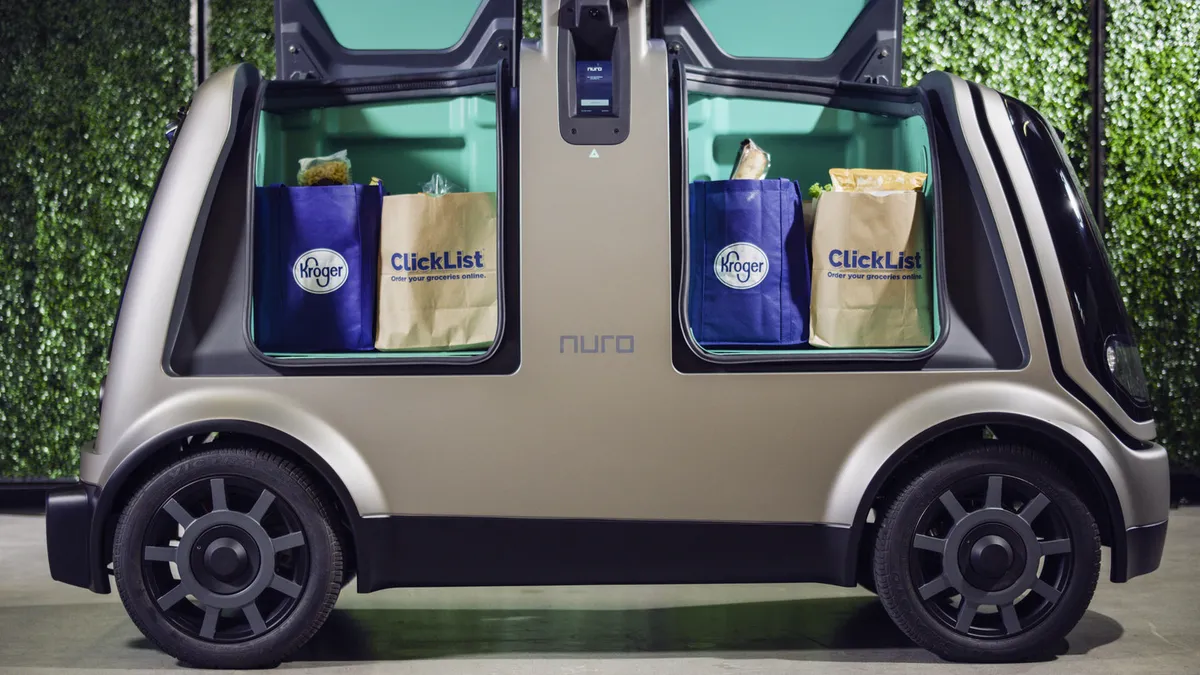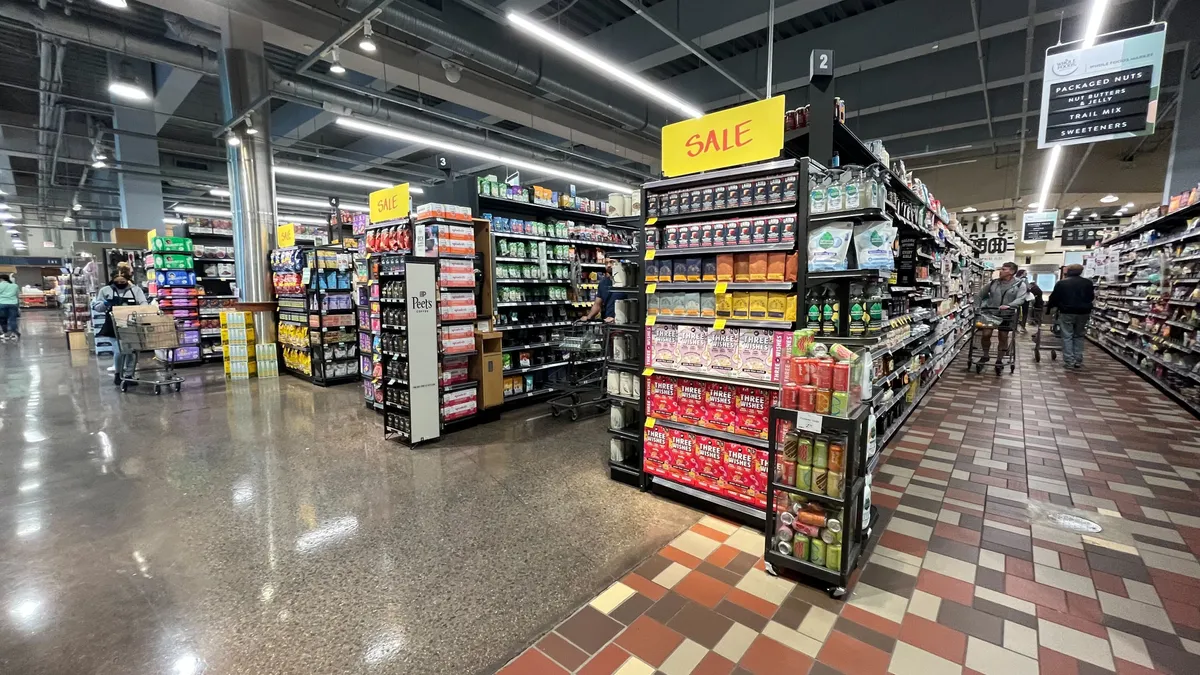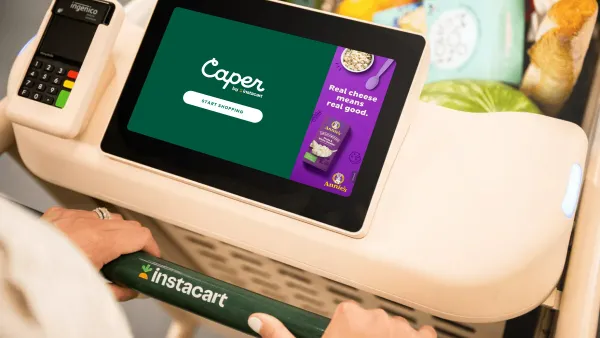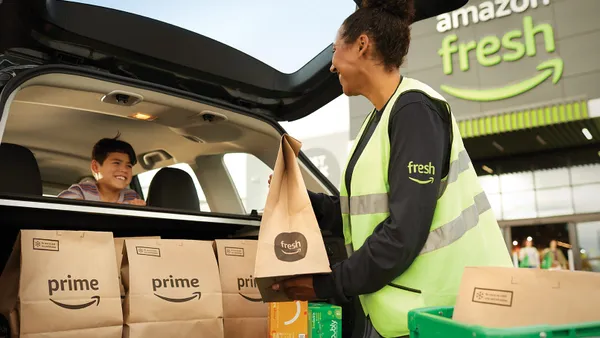Dive Brief:
- Kroger will test a driverless delivery service this fall in a yet-to-be-named market, according to the company. The pilot program, which will happen in partnership with autonomous vehicle company Nuro, will offer delivery through the grocer’s ClickList service, and will include same-day orders. Employees will load up the vehicles at stores, and consumers will unlock them using an access code sent to their phones.
- Officials with Nuro and Kroger say the service promises to make grocery delivery cheaper and easier to do in less densely populated areas. The grocer hasn’t made an investment in the service yet, but according to The Wall Street Journal it may do so if the upcoming test proves successful.
- The announcement comes on the heels of Kroger’s acquisition of meal kit maker Home Chef and its partnership with e-grocer Ocado to build automated fulfillment centers for online grocery. The grocer reported a 1.4% increase in same-store sales during the most recent quarter, and a 66% uptick in online sales.
Dive Insight:
One would expect news about a retailer rolling out driverless delivery to come from Amazon, or perhaps Walmart. But no, the retailer in this case is Kroger, the 135-year-old supermarket chain that is relentlessly focused on staying ahead of the curve.
Much like its investments in meal kits, digital shelves and automated fulfillment systems, driverless technology may take years to bear fruit for Kroger — if ever. But the initiative is promising and aimed squarely at cutting costs while also meeting customers anywhere and everywhere they want to shop.
In addition to reducing labor spending, which weighs heavily on last-mile operations, Nuro’s fully electric vehicles could help Kroger cost-effectively reach low-density markets, opening up its e-commerce platform to more customers. Right now, most delivery services focus on metropolitan markets, where grocers can fill a lot of orders within a limited radius. Kroger currently partners with Instacart and a few other providers for delivery in major markets.
Developed by two ex-Google engineers, Nuro’s fleet is built specifically for delivery, and has been rigorously tested. The vehicles are about as tall as a standard sport-utility vehicle, but are half as wide — a safety measure, according to co-founder Dave Ferguson.
“If you have a vehicle that’s half the width, and you’ve got an extra three or four feet of clearance, you can avoid it... and you have room to maneuver around them,” he recently told The Verge.
Consumers spooked by the recent fatal crash involving Uber’s autonomous vehicle may feel somewhat reassured by this. Overall, people are receptive to the idea of delivery by driverless cars. A survey by the Pew Research Center of 4,000 adults found that half wouldn’t ride in an autonomous vehicle, but two-thirds expect such innovations to deliver their groceries and other goods in the near future.
Will driverless cars be the future of grocery delivery for Kroger? Not likely. If successful, the company will place them in the markets where they most make sense, then do the same with Ocado, Instacart and other delivery options. There’s no one-size-fits-all solution in online grocery, and Kroger will apply its data-focused approach to figure out the best solutions across its network. As Yael Cosset, Kroger’s chief digital officer, told Tech Crunch, this template could even apply to times of the day.
“We may realize the optimal time to use autonomous vehicles is between 10 — 11 in the morning and the rest of the day have a fully staffed model,” he said.
There will be numerous challenges, of course. Nuro's vehicle only travels between 25 and 35 miles per hour, making its speed, not to mention its viability on highways and Interstates, a question mark. Kroger is also far from the only company investing in driverless technology. Amazon and Walmart have both made investments, and it's probably only a matter of time before they catch up to their grocery competitor. In terms of overall innovation, Walmart and Amazon are in a class by themselves, having filed patents on everything from 3-D product imaging to drone delivery.
These challenges make Kroger's mission more difficult, but they don't erase the need for the company to move aggressively on forward-thinking initiatives. Kroger is the largest supermarket operator in an industry that’s undergoing profound disruption. If it doesn’t work to get ahead of its competitors and consumers that are moving online and in all sorts of other directions, it will quickly get left in the dust.














